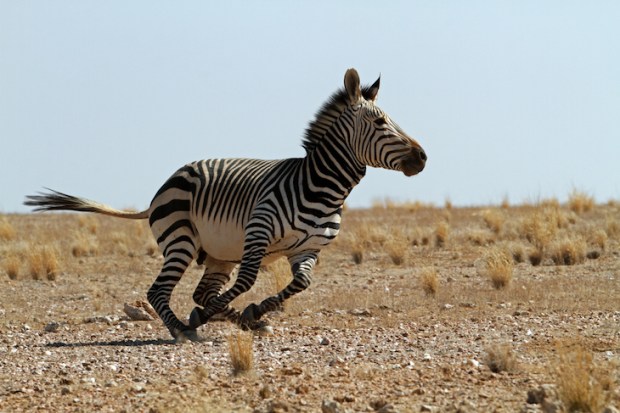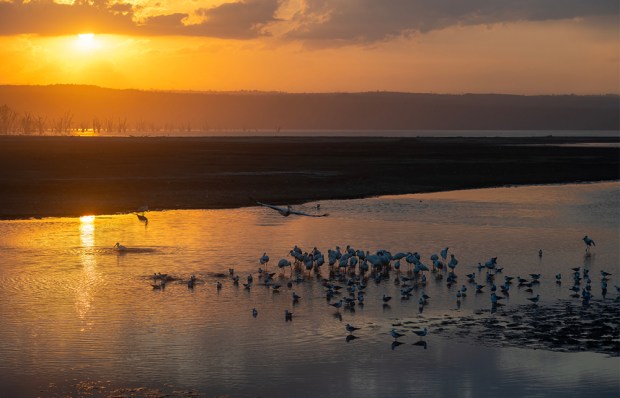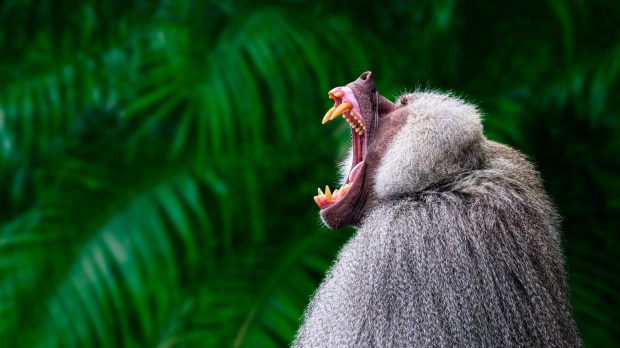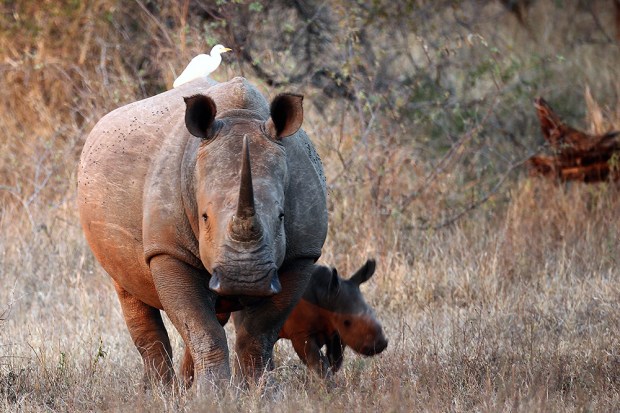Laikipia
‘That elephant is almost human,’ my wife Claire said. ‘That,’ I replied, ‘is the problem.’ I called him Stomper. Like people, elephants are sly and voracious. When I bought a farm I became set against elephants. I love big trees. Elephants are to Africa’s fine trees what gales are to England’s oaks. When a 200-strong herd passes through the farm, they bark-strip trees for fodder. Then they bulldoze them for fun. They may assist with the germination of young trees, but they leave the landscape resembling the battle of Passchendaele. When Britain had mammoths, I bet there were no old oaks.
When I planted a garden our greatest enemy was the elephant. With the agility of racehorses, Stomper and his young bulls leapt over the five-foot perimeter dry-stone walls. They barged around eating everything. At first, illumination flares scared them off. Then Stomper thought he could hide behind midsized trees by sucking his stomach in and being grey in colour. He chased us many times, which was scary. He knocked over all the remaining big trees around the house except three. One night a shotgun was produced and a no. 9 cartridge was aimed in the general direction of his testicles. The pellets bounced off, but Stomper evacuated the area swiftly. We laughed so much at the sight, it hurt. He returned the following night, after our bananas.
Stomper had large tusks. I daydreamed about his ivory being turned into little figurines of Chinese grandmothers. I began to quote the words of Robert Mugabe when commenting on the ivory trade and pachyderms: ‘If you can’t use it, lose it.’ My attitude began to reform four months ago. Young Pokot raiders came along and shot one of Stomper’s askaris, one of his cohorts. They shot him using an AK-47 within a kilometre of the house, so that the gunfire was audible at home. They used an axe to hack out his sub-adult tusks. Within a day his carcass was crawling with maggots. Another time I came face-to-face with a group of gunmen running off after they had slaughtered a bull giraffe, a huge creature, from which they took only the tail for a flywhisk.
Through last year we also suffered the worst drought Kenya has seen for half a century. Up to 80 per cent of the cattle herds around us died. One man with 100 cattle lost every single one, and the day the last one died he hanged himself. Drought, Karen Blixen wrote in Out of Africa, is ‘as if the Universe was turning away from you’.
I became worried about Stomper. He vanished. From the air, the effects of poaching and drought could be seen in the dozens of carcasses littering Kenya’s landscape. The elephant stopped coming for weeks. I would wake at night, hoping to hear the subsonic elephant rumbles. Normally at night, you might hear these together with the rest of the night noises. But there was no sound, other than the blood rushing in my inner ears, and that faint, unceasing rumble of the earth in the highlands.
One day we found a newborn elephant who had collapsed and died on the farm. Within days, its skeleton became a circle of whitened bones that fascinated the children. ‘Are those the baby’s tusks?’ my boy Rider asked. ‘It was too small to have tusks.’ ‘Was its Mummy sad?’ ‘For sure.’
I wondered if it would ever rain again. The landscape was drained of colour. In the water courses the hippos became sunburned. Flocks of storks slouched in trees over river pools where fishes crowded in the soupy water. When the water evaporated, creatures became entombed in mud that hardened to the consistency of concrete. The elephant stood in clusters, shuddering. Their ears flopped forwards loosely over their eyes, like broken umbrellas in the wind.
One day Stomper was spotted in the valley. He stood for a long time in silence. He swayed on his feet. He shivered, and then collapsed like a condemned high-rise block, landing on his side with a seesaw bounce that sent up a cloud of dust. It has rained since. The grass is already long and green. But I miss the old bugger.
Got something to add? Join the discussion and comment below.
Get 10 issues for just $10
Subscribe to The Spectator Australia today for the next 10 magazine issues, plus full online access, for just $10.















Comments
Don't miss out
Join the conversation with other Spectator Australia readers. Subscribe to leave a comment.
SUBSCRIBEAlready a subscriber? Log in